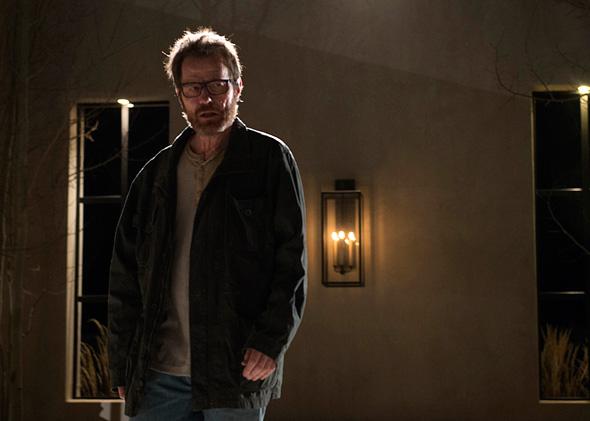Breaking Bad is the most brutal show I’ve ever watched from start to finish. It has been almost perfectly executed—precise in plot and vivid in character, with taut dialogue, mordant wit, and photography that’s eerie and ordinary and beautiful in places. It showed a sense of humor in its spot-on soundtrack.
But until the finale Sunday, I never thought of this as a show that was made with love—or that took love as its central theme. This last hour brimmed with love, though—its cup ran over. Maybe that will read as sentimentality to some viewers. Maybe I should have the critical distance to see it. But I don’t. I feel entirely satisfied. The show turned itself inside out, and it’s making me see the whole arc—all the hours that led up to this one—in a way I hadn’t before.
I gave up on Walt in the last half season. I wrote him off, for being a megalomaniac who was willing to hurt almost anyone, and especially for constantly justifying himself with his talk of family. He won me back on Sunday. Not with his cancer cough and his old man’s shuffle (though I’m in awe of Bryan Cranston’s range). Here’s Walt’s best moment, alone for the last time with Skyler:
“I did it for me. I liked it. I was good at it. And I was, really … I was alive.”
Walt finally drops his pose and his wild delusions. He gives Skyler the truth. And actually, he goes further. He also gives her the lie that will allow her, and his children, one day to accept the $9.7 million he left piled on top of the Schwartz coffee table. Walt tells Skyler he has spent all the money. He makes sure to debase himself, to give up on the triumph that has driven him all along. He’ll die broken and penniless in her eyes, and he allows for that shredding of his pride because it is what his family needs to remake itself one day. Maybe someday Skyler will be able to admit to herself that she liked it, too, and that honesty will give her the wherewithal to put her cigarette out, get up from the kitchen table, and start living again.
So is Walt really a family man? Is that what we’re meant to feel as he touches Holly’s curls one last time and hangs around for a last look at his son? I don’t think so. The morality of Breaking Bad doesn’t give Walt that much. His moment of clarity at the end doesn’t make up for all the hubris of Heisenberg. But it did mean I could wholeheartedly root for his scheme of revenge.
I don’t think Walt’s last chess moves were supposed to be hard to predict, at least not once they started unfolding. My husband called them in advance: the Schwartz money-laundering, the ricin in Lydia’s Stevia, the automated machine gun for the Aryans. It wasn’t a roller coaster of an episode: It all unfolded methodically, with time for a last lingering shot of the Southwest desert. “Just get me home,” were Walt’s first words, and once he left the snow behind, he was at his canny best. But this time, there was no mania, no crazy desperate bid for glory.
Walt was willing—as he hasn’t been for many episodes—to turn his weakness into his weapon. He got his five minutes with Lydia so he could poison her. The Aryans let him through the gate, without searching his trunk, because they were sure they had nothing to fear. Walt’s only strutting in this hour was for Elliott and Gretchen Schwartz, when he turned sorcerer with the red lights that hit their chests. For a moment, he was magic. And then of course it was all a joke pulled off with the help of the meth heads. “The whole thing felt kind of shady, morality wise,” one of them said before he gets his wad of cash. But it didn’t really. Walt’s play on Gretchen and Elliott feels fair. We’ll never know all the details of what happened with Gray Matter, but we know enough to agree with him: They owe him.
What about Jesse—did Walt know he was being kept prisoner? I don’t think so. When the meth heads say Jesse must be cooking again, Walt’s lip curled with what looked like rage to me. He cast Jesse as the impostor.
When Walt saw what Jack and Todd had done to Jesse, though, he turned back into Jesse’s father. That’s what it meant to cover Jesse’s body with his own as the bullets rained down. Walt gave Jesse his freedom, and then he visited his magical meth lab. He went back to his tools—his workshop. Maybe that was the double meaning of the sepia-toned fantasy Jesse had about building that exquisite wooden box. “I did it for me. I liked it. I was good at it. And I was, really … I was alive.” That’s what this show was about: the battle to find glory, somehow, as a kind of down-and-out, hands-a-flutter suburban dad. Walt did it. He found what he was looking for. That’s what we’ll remember.
This should make one hell of a story,
Emily
—
Related in Slate: Willa Paskin on how the Breaking Bad finale revealed that Vince Gilligan was Team Walt all along.
Matt Yglesias asks if the plot of the finale wasn’t totally absurd.
June Thomas on Breaking Bad’s celebration of virtuosity.
